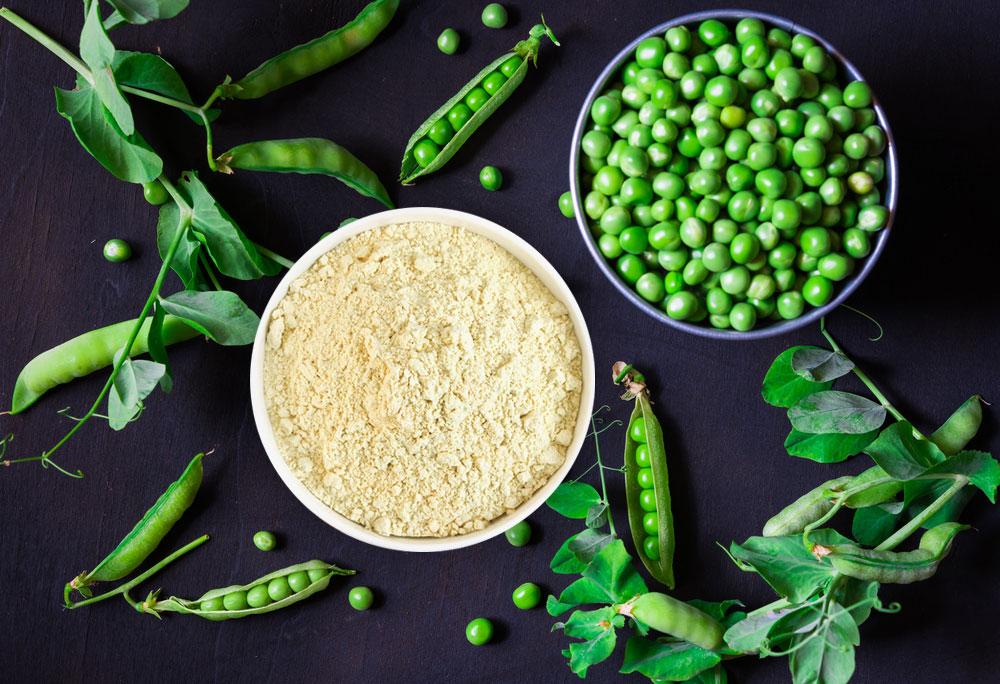Pea Protein: The Complete Plant-Based Protein Source

Pea protein is becoming increasingly popular as a plant-based alternative to whey or soy protein. With its complete amino acid profile and ease of digestion, pea protein provides many benefits for health and fitness.
What is Pea Protein?
Pea protein is derived from yellow split peas and has a neutral taste that lends itself well to a variety of foods and supplements. Split peas are dried and hulled, then milled into a fine powder. Pea protein is a complete plant protein, containing all nine essential amino acids that the human body cannot produce on its own.
Benefits of Pea Protein
Beyond its protein content, Pea Protein offers several notable health benefits:
Complete Protein Profile
At around 24 grams of protein per 1/4 cup serving, pea protein contains all essential amino acids. This complete protein profile means pea protein can effectively support muscle growth and recovery on par with animal proteins like whey.
Easy to Digest
Pea protein is hypoallergenic and very easy to digest compared to other plant proteins like soy or wheat. This makes it a great option for those with food sensitivities or gastrointestinal issues.
Supports Muscle Growth
Animal studies show pea protein stimulates muscle protein synthesis after exercise, suggesting it supports muscle growth and strength gains when combined with resistance training.
May Aid Weight Management
Early research in humans found supplementing diets with pea protein could modestly boost calorie burning and curb appetite more than other proteins. This may support weight or fat loss efforts when part of an overall healthy diet.
Cholesterol Lowering
Pea protein contains soluble fibers that help reduce LDL (bad) cholesterol levels. Lower cholesterol levels lower the risk for heart disease and stroke.
Rich in Nutrients
Peas provide good doses of vitamins, minerals and antioxidants as well. Just one serving of pea protein provides 10-15% of daily fiber, manganese, iron and vitamin K needs.
Forms of Pea Protein
Pea protein comes in a few different forms to suit various uses:
Pea Protein Isolate
Pea protein isolate is around 90% protein by weight and has the lowest carbohydrate and fat content of all forms. It dissolves easily in water or other liquids. Isolate is best for smoothies, protein drinks or baked goods.
Pea Protein Concentrate
Concentrate is around 70-80% protein and has more carbohydrates and fat than isolate. It has a coarser texture and earthier flavor well-suited to flour-based recipes like pancakes, breads or pastas.
Textured Pea Protein
Also called pea protein chunks or crisps, this form closely mimics meat texture and taste. It is made by extruding pea protein concentrate into strings or nuggets then baking or crisping. Great for vegetarian or vegan meat substitutes.
Using Pea Protein in Your Diet
Whether your goal is adding more plant-based nutrition, building muscle or managing weight or health conditions, incorporating pea protein into your diet offers substantial benefits. Here are some easy ways to enjoy it:
Smoothies - Blend pea protein powder into fruit- or veggie-based smoothies for extra protein without disrupting texture or taste.
Baked Goods - Partially or fully substitute pea protein powder or concentrate for wheat flour in pancakes, bread, muffins or protein bars.
Oatmeal or Cereal - Stir a scoop of pea protein powder into cooked oats, granola or cereal for extra satiety and nutrition in your breakfast bowl.
Soup or Stew - For extra plant-based protein, simmer pea protein chunks in vegetable- or legume-based soups and stews.
Salads - Toss crispy roasted pea protein chunks onto mixed green salads or grain-based salads for extra protein crunch.
Pasta or Rice Dishes - Use textured pea protein chunks in place of chicken or other meat in pasta primavera, stir fries or rice bowls.
Pea protein also blends well into hummus, dips, smoothie bowls or can be baked into veggie burgers, meatballs or other vegetarian protein snacks. The versatility of pea protein makes it easy to work into any diet.
Is Pea Protein Right For You?
With no major allergens, easy digestion and balance of nutrients beyond just protein, pea protein is an excellent protein source for most people. Those who could especially benefit include:
- Vegetarians and vegans seeking a complete plant protein
- Individuals with food sensitivities to dairy, soy, eggs or other common proteins
- Active individuals engaged in muscle-building sports or exercise programs
- Anyone pursuing weight management through a calorie-controlled diet
- Those looking to lower overall cholesterol levels through diet
With more research still emerging about pea protein’s health potential, it's fair to say this plant-based protein packs plenty of rewards and poses few risks for the majority of consumers. Pea protein is here to stay as a fiber, nutrient and protein-rich addition for diets both plant-based and otherwise. With creativity, it easily incorporates into favorite recipes to boost their nutritional profile.
Get More Insights On This Topic: Pea Protein
- Art
- Causes
- Crafts
- Dance
- Drinks
- Film
- Fitness
- Food
- Games
- Gardening
- Health
- Home
- Literature
- Music
- Networking
- Other
- Party
- Religion
- Shopping
- Sports
- Theater
- Wellness
- IT, Cloud, Software and Technology


